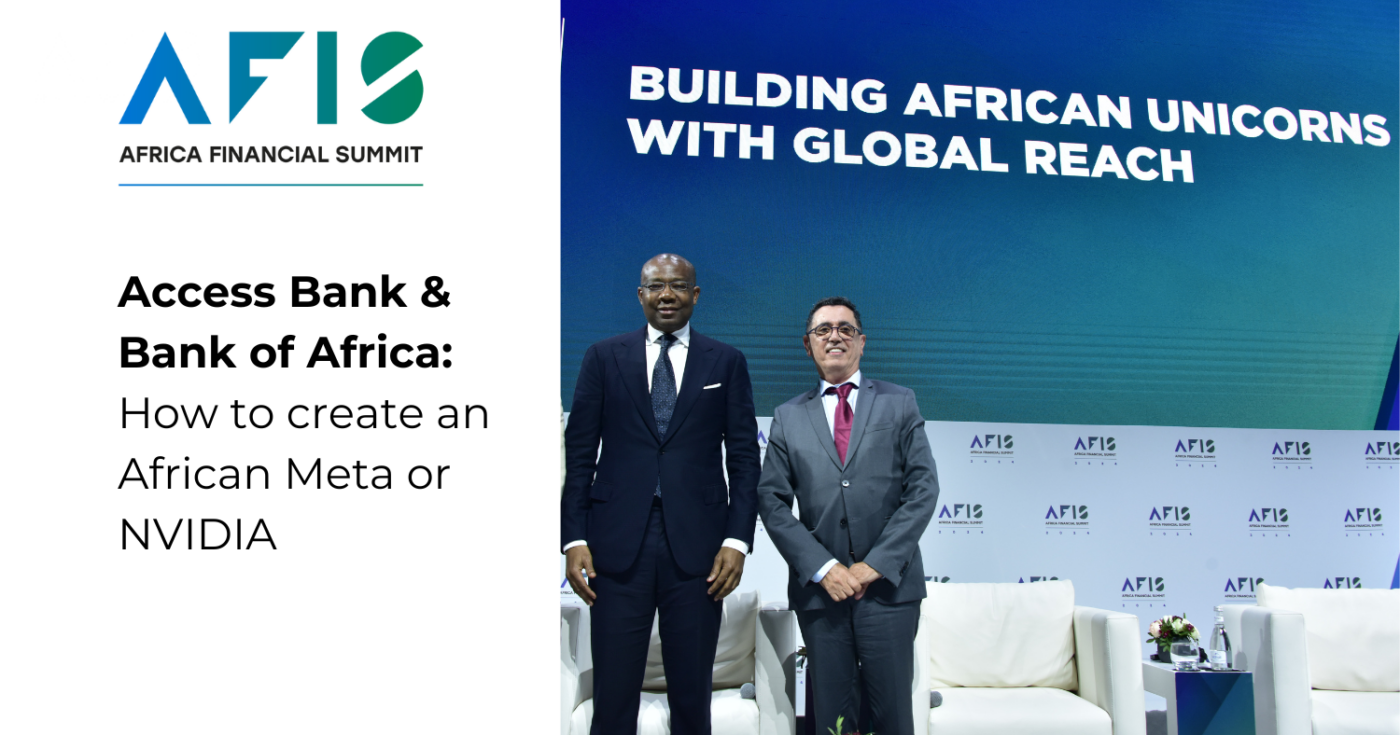Access Bank & Bank of Africa: How to create an African Meta or NVIDIA

Cultivating Africa’s own corporate giants comparable to Meta, NVIDIA, and America’s Magnificent Seven holds the key to the continent’s economic leap forward. Leaders from Nigeria’s top banking group, Access Holdings, and Morocco’s Casablanca-based Bank of Africa say this can be achieved by nurturing fast-growing gazelle companies.
Africa is now home to over 300 companies which have over a billion in annual turnover, a small number for a continent of its size.
Speaking at AFIS 2024, Amine Bouabid, CEO of Bank of Africa, said this poses big problems for jobs in Africa.
“There is no big corporation. There [are] no big champions. Big champions in Africa? You can count them on your hands,” he said. According to the Moroccan banking boss: “This is a consequence of environment.”
Africa is short of ‘gazelles’
Aigboje Aig-Imoukhuede, Chairman of Access Holdings, said Africa’s path forward relies on ‘gazelle’ businesses – highly scalable, innovative companies poised to transform entire industries.
“These are businesses that…would be called an early Meta, an early Google, an early NVIDIA and they cross sectors from industry, manufacturing, services and so on,” he said.
“The key to these businesses is that they innovate, and they have great talent that can execute in a way that creates value in an economy,” he continued.
“In India and China, you have companies like Alipay and you have the Ping Ans of this world, and they’ve transformed from being the gazelle to the unicorn in some instances the elephant. Now in Africa, we are not building enough gazelles, and that is the challenge,” said the Nigerian, who is also the chairman of Coronation Group.
Can recent unicorns become elephants?
Last year, Nigeria’s Moniepoint and South Africa’s Tyme Group became unicorns and nine others – Wave (Senegal); Flutterwave (Nigeria); Interswitch (Nigeria); Opay (Nigeria); MNT-Halan (Egypt); Andela (Nigeria); Chipper Cash (Ghana); Moniepoint (Nigeria); Tyme Group (South Africa) – achieved the status in recent years. All but one is in digital financial services.
African unicorns are however nowhere near the level of global giants formed in the last 30 years such as Meta.
“You have the sexy term ‘unicorn’, but what is more important to me is when they grow into ‘elephants’,” said Aig-Imoukhuede, meaning companies equivalent to the U.S. Magnificent Seven (Apple, Microsoft, Google parent Alphabet, Amazon, Nvidia, Meta and Tesla), which make up 36% of the US equity market value.
Four pillars for gazelle success
Bouabid and Aig-Imoukhuede outlined four levers to scale Africa’s gazelle companies:
- Grow private sector credit to GDP from 26% to 50% in next decade
For Bouabid, nurturing SMEs and enhancing private sector credit penetration—currently averaging just 26% of GDP across Africa—is vital. “We have to set an ambition to go to 50% in 10 years. And we have to follow this KPI every year,” he said. - Foster talent retention to cultivate Africa’s business champions
For Aig-Imoukhuede, reforming education and cultivating an environment that motivates skilled professionals to remain on the continent is crucial. “Africa is not helped by the fact that some of our best talent migrates and leaves our continent, and helps basically create the champions in other continents,” he said. - Strengthen venture and early-stage investment ecosystems
The Access Bank chairman sees banks as essential, but equally critical is nurturing robust angel and venture capital networks. “You look at the startup ecosystem and the angel community, those people who provide you early-stage funding, pre seed funding are as important,” he said. - Creating policy incentives and vibrant national systems
Aig-Imoukhuede highlighted the importance of policy-driven incentives and national ecosystems that foster innovation and drive entrepreneurship. “The U.S. is probably the best example of this. We do know that in Africa, on a country basis, not many national ecosystems are strong,” he said.
The Access Holdings chairman said that he hoped to see 5-10 more African gazelles become unicorns ($1bn+ valuations) in the next 20 years, and for a few to become truly elephant-sized businesses.
Watch the two banking leaders in conversation with The Economist’s Global Business Correspondent Anjani TRIVEDI at AFIS 2024: